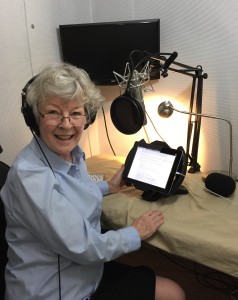‘The isle is full of noises, sounds and sweet airs…..sometimes voices…’ says Caliban of Prospero’s island. My island is England and, recently, the noises have been voices, accents and dialects.
The audio-book of ‘The Village; A Year in Twelve Tales’ is now almost ready. Despite being  somewhat later than planned, Elizabeth and I now see the end in sight. It has proved more difficult than we envisaged.
somewhat later than planned, Elizabeth and I now see the end in sight. It has proved more difficult than we envisaged.
Regular readers of this blog may recall that, back in June, I wrote about making the audio-book using the ACX ( Audiobook Creation Exchange ). The process so far has been pretty seamless. What has been less so is getting the voices right. I can only praise Elizabeth’s patience with this author, who, I confess, asked far, far too much of anyone in asking for voices to be  differentiated by accent. Consistency of accent in multiple-voice stories is, I have learned, accepted as one of the big problems that narrators have to deal with when narrating a book.
differentiated by accent. Consistency of accent in multiple-voice stories is, I have learned, accepted as one of the big problems that narrators have to deal with when narrating a book.
Nonetheless, I think we’ve produced something good. We’ve been using the International Dialects of English Archive, or IDEA, to identify exactly the accents to be used. This is a tremendous resource, containing a range of voices from every region of England, though some regions are better represented than others. I had fun looking for the ‘rural’ accents which I remembered from childhood. Some are there, some aren’t (maybe my own recollection has changed over the years). The variations of accent within region are sometimes startling, as is their staying power. There is one recording of a woman, born in the south of England, but having lived in Wales through-out her childhood. Even though she returned to southern England thereafter and is recorded later in life, there is a Welsh intonation in her pronunciation of certain words and phrases. As a resident of  south London I found the London accents especially interesting.
south London I found the London accents especially interesting.
For ‘The Village’ Winnie’s accent proved the most problematical. As a life long resident of the village and representative of the old, indigenous families, she had to be just right. She also features in a lot of the stories, in varying situations and she experiences a wide range of emotions. After trawling the archive I lit upon the recorded voice of an 81 year-old woman who seemed perfect (I’m not going to say from whence she hailed, though it wasn’t anywhere near where I thought I would get the accent from). Elizabeth duly interpreted it into the recording.
It’s been an interesting experience and I’ve learned a lot. I’ll use IDEA again. I can often ‘hear’ characters speak in my head, when I am writing, but, having to consider how a character sounds at the outset, rather than after a book is written, or during the process, will be good discipline. It should inform how I write their dialogue, the language they use and its impact on the characters around them. Since starting to write, I am aware that, when I listen to the radio, TV or just conversations in the street, I now listen to ‘dialogue’ rather than voices. After all, there might be something useful I could use. Having created the audiobook will make me listen to voices too. That’s even more useful.
If you enjoyed reading this post you might also enjoy How does a book sound? The making of a audiobook Oh, to be in England


 RSS – Posts
RSS – Posts